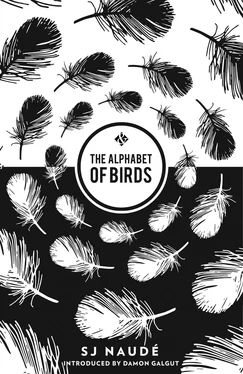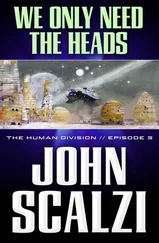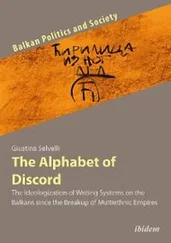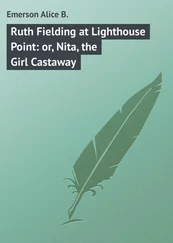The air is moving. The leaves of the pin oak are falling ceaselessly, their stems impaled in the lawn. The tips of the leaves tremble in the breeze like nerve endings.
In the course of an afternoon, his mother’s complexion changes from grey and transparent to yellow. The vomiting commences. It doesn’t stop. She has not eaten for days; there is only bile. It is as if an external force is controlling her, making her shudder to her fingertips. Even her eyes are yellow: the eyes of a devil.
Food, when he tries to eat, congeals on his palate. He sits on his own at the kitchen table. Ultimately he has to spit out the grey masticated mush onto the porcelain.
The freezer is overflowing. While she had the strength, she spent her days cooking. Baked puddings and loin of lamb, trifle and stuffed shoulder of venison, oven-roasted chicken with a lemon where the bloody intestines used to be. But these are not for her; they’re a legacy. She has now forsworn the body’s banalities, the lower functions. He is standing in front of the freezer, chilly fog billowing onto his feet. There are plastic bags, aluminium dishes and plates Serried in rows, the contents unidentifiable, everything furred with frost. Nausea wells up in him. A cupboard full of cadavers. Fossils of the future. He works up a fury against his mother. The ice age has dawned.
He meets Hisashi in the French embassy in London, about two years before his return to South Africa for his mother’s last months. They are introduced to each other by a mutual acquaintance, one of Hisashi’s French colleagues, Philippe. Philippe is engaged in a uniquely French version of conscription. Or, rather, Philippe chose ‘community service’ as an alternative, which entails travelling between French embassies across the world marketing champagne on behalf of French regional authorities. He organises glittering events in lavish interiors in London, New York, Beijing or Kuala Lumpur for guests clothed in expensive textiles, impeccably cut, where the champagne, flanking bowls of fraises , fizzes against crystal.
Sometimes he wishes he were French too. The joys of what is not immediately useful, of the mellow delights and nurturing of an old culture, could have suited him well. Better, at any rate, than the diaspora of fearful, grim, white children from South Africa of which he forms a part, like it or not.
He doesn’t really know what Hisashi does at the embassy — generic administrative work of some sort. Nor does he know what the driving force of the friendship between them is. There is little common ground. Be that as it may, before long they are planning a trip together to Vietnam and Japan. At first, in fact, only to Japan. He has long been interested in an eclectic variety of Japanese things. From Kabuki and Noh theatre to manga in all forms and travesties. From the woodcut prints of the Floating World and writers like Mishima, Ōe and Murakami, to underground bands from Tokyo with names like Ghost, Angel’in Heavy Syrup or Acid Mothers Temple.
Perhaps it is simple. Perhaps the unlikely friendship is fuelled simply by the fact that Hisashi is Japanese. An old-fashioned kind of exoticising. And, because he so carefully preserves Hisashi’s strangeness in his own mind, he doesn’t really know what Hisashi in turn might be drawing from the friendship.
The Vietnamese extension to the trip is inspired by Philippe, with his second-hand nostalgia for the former French colonial territoire . One notices it immediately in Philippe, the inherited memory. The sedimented layers of historical reminiscence. He is often struck by the way his European friends remember places they have never known.
In Philippe’s flat there are photos of his great-grandfather in Saigon during the Franco-Siamese war of 1893. Another of his grandfather in the first Indochina war. A grandmother in Hanoi, in a garden full of flowers that look familiar to Philippe, but that he cannot name. Inherited artefacts on a sideboard, a drawer full of little objects of silver and silk: handmade trinkets that conjure up a vanished world.
For his European friends, the dead are alive and the vanished places still exist. Loss is in their blood, the boundaries of time permeable. How different it is for him, a naïf from the remote Third World. For the recently dispersed with their encumbering passports. To them everything is new; everything has to be discovered and experienced and lost from scratch.
He pleads, holds out half-teaspoons of soup towards her pursed lips. Nothing.
He does not stop cooking. He reduces the portions so as not to overwhelm her. Smaller and smaller the mounds of food become. At one point he kneels before her bed as before an altar, offering crumbs as if to a sparrow-goddess.
He thought the battle was about getting her to eat, but no. It is, he now realises, about who is caring for whom. She wants to look after him from her bed. Sometimes she is too weak to speak, but she is obsessed with what he is eating, wants to know what he is taking from the freezer and preparing for himself. He is, after all, her child. And he persists in bringing her small offerings.
He stops eating too. He makes sure that she knows it. Refusal is easy.
When he walks out into the garden, the trees are bare. A carpet of pin-oak leaves covers the lawn. Days have passed since he last set foot outside the house.
Hisashi calls. He has made it clear to his Japanese friend, as politely as possible, that he must maintain a reasonable distance, that now is hardly the best moment for a visit. He has sketched only the broad outlines of the situation. Even so, Hisashi calls him once a day. He doesn’t say much. Just calls and then waits for him to initiate the conversation.
‘As I said, Hisashi, I’m sorry I can’t show you around. It just isn’t possible at the moment.’
‘I’m managing. I have a car. I have a hotel. Don’t worry.’
Cheerful silence.
Hisashi’s imperturbable good cheer irritates him, rubbing up against his own despondency. What the Japanese man is doing in this dull provincial place he cannot fathom. There’s nothing to see here. Nothing to learn. Nothing to lift the heart. One does not travel here to civilise oneself.
By the time their trip to Asia comes around, Hisashi has already moved back to Tokyo, where he now works at the Alliance Française. He himself is still in London. They fly out to Vietnam: one from the west, the other from the east. They meet in Hanoi. They book into a modern hotel. The air is grey and murky. The streets are rivers of scooters. When you cross, the scooters open around you like currents around an island. Hisashi is mistaken for a Vietnamese, even though he is in fact too large to be either Japanese or Vietnamese. He is from the southernmost corner of Japan, from the countryside, not far from Nagasaki. Peasant stock. His forebears were scorched brown on the watery rice paddies. Over centuries their feet have become waterlogged, swelled and lost their shape. Hisashi is heavy, bigger than he. Dark. His feet fleshy.
They want to do different things. He wants to visit the art museum, take pictures of the Buddhist-Communist kitsch of Ho Chi Minh’s grave and the French colonial buildings, visit the street with dog restaurants. Hisashi wants to sleep during the day and then wander around endlessly at night observing people, visiting karaoke bars and drinking Vietnamese coffee in cafés filled with teenagers. Before long, misunderstandings arise. Hisashi’s English is surprisingly limited for someone who has lived in London for a few years. Sometimes they try to converse in French, but Hisashi’s French is even worse than his own.
During the day he goes about on his own, Hisashi staying behind at the hotel. He goes into a dusty shop selling Communist propaganda posters from the old days. He buys one inciting the young proletariat to make pig farming the future of the socialist Vietnamese state. The poster shows a young man and a young woman, both of implausible proportions, the perspective from below, rays of sunlight fanning out behind them. Each is clutching a heroic piglet under the arm. Each with a fist in the air.
Читать дальше












